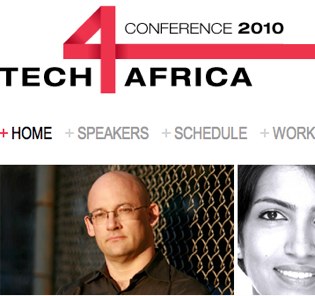 This article was written by Leila Janah, the founder and CEO of nonprofit outsourced services firm Samasource. You can watch my recent video interview with Janah here. Also see her recent article The Many Bottom Lines Of Businesses.
This article was written by Leila Janah, the founder and CEO of nonprofit outsourced services firm Samasource. You can watch my recent video interview with Janah here. Also see her recent article The Many Bottom Lines Of Businesses.
This week in Johannesburg I had the pleasure of keynoting Tech4Africa, the first major social web conference in South Africa, alongside crowdsourcing guru Clay Shirky.
Sub-Saharan Africa is the global economy’s last frontier. The majority of people in Africa live on less than $2 a day, adjusted for purchasing power. It’s not the first place one might expect to host a technology conference.
Since I started working in Africa 10 years ago, I’ve seen a steady rise in the number and quality of African technology training centers. Schools like Ghana’s Ashesi University, founded by former Microsoft executive Patrick Awuah, are churning out math, science and engineering talent. Hundreds of developers turned up when Samasource hosted Facebook Developer Garages in Accra, Nairobi, and Kampala in 2008 and 2009. Several technology incubators and co-working spaces have sprung up around the continent – here’s a brief list (Thanks to Erik Hersman, founder of popular crowdsourced mapping platform Ushahidi, for a primer on African tech incubators):
–iHub (Nairobi, Kenya)
–Appfrica Labs (Kampala, Uganda)
–Limbe Labs (Limbe, Cameroon)
–Meltwater Entrepreneurial School (Accra, Ghana)
–Geekspaces (Johannesburg, South Africa)
At Foo Camp this June, I tried to convince Paul Graham to start a Y-Combinator in Nairobi; he chuckled and said he’d rather fund an incubator for less glamorous businesses, like gas stations and plumbers. High-tech innovation that achieves global scale, he argued, tends to flow from developed to emerging markets, not vice versa.
The Silicon Valley entrepreneurs I’ve spoken to agree with Paul, and they have a point. In much of Africa, it’s hard enough to find grid power, let alone Wi-Fi. There’s very little infrastructure or capital for new businesses. According to the IMF’s annual Doing Business report, African countries are the most difficult places in the world to launch startups.
That hasn’t swayed the entrepreneurs I met at Tech4Africa. Many of them are working on mobile solutions for emerging markets, a segment that now includes roughly four billion people who live on $4 a day or less. Their innovations never have to reach the US or Europe to reach scale. Take, for example, the telecommunications firm Safaricom’s wildly successful mobile money transfer service, Mpesa. Mpesa (“money” in Swahili) has facilitated over $4B in transactions since its launch in late 2007 – and that’s in a country with an adjusted annual per-capita income of under $1,700.
Based on the success of Mpesa and a similar service launched by Safaricom rival MTN, Pocit, in South Africa, Pagatech in Nigeria, and PesaPal in Kenya are developing bank- and carrier-independent mobile transfer services. These businesses could facilitate billions of dollars that flow in remittances from urban to rural areas in the developing world each year.
Other African startups to watch include Moo.com Co-Founder Stefan Magdalinski’s new gig, Mocality, a mobile phone crowdsourcing platform for verifying local businesses in Nairobi; and Txteagle and Mobenzi, which allow people to complete microtasks on their phones via SMS in Kenya and South Africa, respectively.